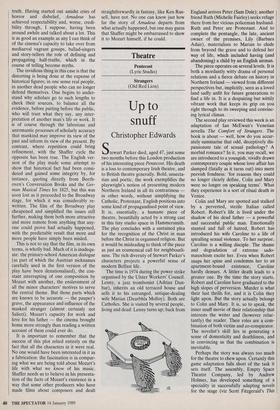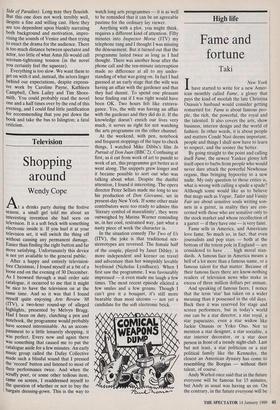Theatre
Pentecost (Lyric Studio) Strangers (Old Red Lion)
Up to snuff
Christopher Edwards
Stewart Parker died, aged 47, just some two months before this London production of his interesting piece Pentecost. His death is a loss to contemporary Irish theatre, and to British theatre generally. Bold, unsecta- rian and poetic, the work exemplifies the playwright's notion of presenting modern Northern Ireland in all its contrariness in other words, without simplifying the Catholic, Protestant, English positions into some kind of propagandised point of view. It is, essentially, a humane piece of theatre, beautifully acted by a strong cast in this tiny studio space in Hammersmith. The play concludes with a sustained plea for the recognition of the Christ in man before the Christ in organised religion. But it would be misleading to think of the piece as just an ecumenical call for neighbourli- ness. The rich diversity of Stewart Parker's characters projects a powerful sense of modern Belfast life.
The time is 1974 during the power strike organised by the Ulster Workers' Council. Lenny, a jazz trombonist (Adrian Dun- bar), inherits an old terraced house and sells it to his estranged, antique-dealing wife Marian (Dearbhla Molloy). Both are Catholics. She is visited by several people, living and dead: Lenny turns up; back from England arrives Peter (Sam Dale); another friend Ruth (Michelle Fairley) seeks refuge there from her vicious policeman husband. Ruth and Peter are Protestant. And to complete the pentangle, the late, ancient owner of the premises, Lily (Barbara Adair), materialises to Marian to chide from beyond the grave and to defend her way of life, which included having (and abandoning) a child by an English airman.
The piece operates on several levels. It is both a mordantly witty drama of personal relations and a fierce debate on history in Northern Ireland — viewed from different perspectives but, implicitly, seen as a loved land sadly unfit for future generations to find a life in. It is a despairing but wittily vibrant work that keeps its grip on you right through to its sweeping and convinc- ing lyrical climax.
The second play reviewed this week is an adaptation of Ian McEwan's Venetian novella The Comfort of Strangers. The book is about — well, how do you accur- ately summarise that odd, deceptively dis- passionate tale of sexual pathology? A morbid romance? In it, you may recall, we are introduced to a youngish, vividly drawn contemporary couple whose love affair has slumped (fatally as it turns out) into mere peevish fondness: 'for reasons they could no longer clearly define, Colin and Mary were no longer on speaking terms'. What they experience is a sort of ritual death in Venice.
Colin and Mary are spotted and stalked by a perverted, sterile Italian called Robert. Robert's life is lived under the shadow of his dead father — a powerful and successful public man. Emotionally stunted and full of hatred, Robert has introduced his wife Caroline to a life of spiralling sexual violence. To her surprise, Caroline is a willing disciple. The shame and degradation of extreme sado- masochism excite her. Even when Robert snaps her spine and condemns her to an apartment-bound existence, Caroline hardly demurs. A littler death leads to a greater one. By the time the story starts, Robert and Caroline have graduated to the high slopes of perversion. Murder is what their lust thrills for, and it is Colin they light upon. But the story actually belongs to Colin and Mary. It is, so to speak, the inner snuff movie of their relationship that interests the writer and (however reluc- tantly) the reader. Their roles are a com- bination of both victim and co-conspirator. The novelist's skill lies in generating a sense of domesticity and deathliness, and in convincing us that the combination is inevitable.
Perhaps the story was always too much for the theatre to chew upon. Certainly this game adaptation falls short of the task it sets itself. The assembly, Empty Space Theatre Company, led by Andrew Holmes, has developed something of a speciality in successfully adapting novels for the stage (viz Scott Fitzgerald's This Side of Paradise). Long may they flourish. But this one does not work terribly well, despite a fine and willing cast. Here they are too dependent upon blankly narrating both background and motivation, impro- vising the sounds of Venice and then trying to enact the drama for the audience. There is too much distance between spectator and actor, too little of what Amisfils would call scrotum-tightening tension (in the novel you certainly feel the squeeze).
Everything is too slow. We want them to get on with it and, instead, the actors linger behind our expectations, despite express- ive work by Caroline Payne, Kathleen Campbell, Chris Lailey and Tim Shoes- mith. You could probably read the novel one and a half times over by the end of this evening, and I could find little justification for recommending that you put down the book and take the bus to Islington; a fatal criticism.



















































 Previous page
Previous page